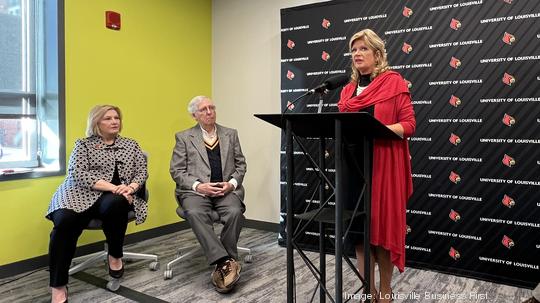
Senate Minority Leader Mitch McConnell made his way to the University of Louisville campus on Thursday to announce $20 million in new federal funding will soon be available through the National Security Agency (NSA) to create new resources for the university's cyber workforce training initiative.
Although none of that money has been directly earmarked for UofL, its leadership team likes its chances in securing some of that funding, given its track record and previously established programs.
“We’ve got a strategy that is strong … because [the NSA] sees the value with what we’ve done,” Sharon Kerrick told me after a press conference at the UofL Center for Engaged Learning on the Belknap Campus.
Kerrick serves as the assistant vice president and executive director of the UofL’s Center for Digital Transformation. In fiscal year 2021, Kerrick and her team were able to secure a $6.3 million grant from the NSA to create the Cybersecurity Workforce Certificate pilot in conjunction with several other universities and colleges, including Bluegrass Community and Technical College. Her team secured another $2.2 million in the same manner in fiscal year 2022 to build out the grant’s logistics component.
The program, so far, has had more than 200 enrollees, many of whom first responders when it comes to health care-related cybersecurity threats.
The certificate program consists of several different cybersecurity training modules — forensic, cryptology, Internet of Things, blockchain, to name a few — ranging from entry to expertise levels, with many scholarships still available at the moment through the initial wave of funding.
“That has now laid the groundwork for the potential to utilize and leverage, now, all these resources that we have built,” Kerrick said.
Kerrick said her team is now focusing its efforts on the “training the trainer” aspect of what the program can do given the many partnerships it has formed with universities across the country.
“We are building a national hub or a national coalition of different entities, for us to then become a national train-the-trainer whereby we can have the resources and leverage tax-paying dollars [so] that we can leverage all the resources that different universities and colleges have had, where we have applied learning,” said Kerrick, who was named our 2019 Business Women First Mentor of the Year.
Meeting training, market needs
Kerrick was one of the founding partners of Micro Computer Solutions, as well as a senior vice president.
She told me that 20 years ago, her company would train 11,000 to 13,000 students a year on cybersecurity issues.
“Back in the day, we were cranking out the people,” she said. “Now, you have to rely on people just to [train] online and not everybody learns like that.”
To address that issue, her program has implemented “success coaches,” who can watch students and see where they become “stuck” and then reach out to the student through a video chat between the student and the instructor.
Through additional partnerships with IBM, Microsoft (NYSE: MSFT) and Google (Nasdaq: GOOGL), cybersecurity certificate program participants also can receive badges, trophies and micro certificates through those entities as well, Kerrick said.
The latest funding comes via the Omnibus Appropriations Bill, which was passed in December.
“Built into a number of these bills that ended up in the omnibus were things that I thought were important for this university,” McConnell said. “Kentucky’s university system is at the center of our country’s cybersecurity field — and I’ve tried to help them get there. That doesn’t just help prepare our students with a 21st Century skillset. It also benefits our economy and strengthens our national security.”
Kevin Gardner, UoL’s executive vice president for research and innovation, said the funding would most likely not be available for six to nine months.
“We have had two tranches of money so far, and expect a third through similar appropriations in previous years,” he said.
Referencing the recent news of Microsoft laying off 10,000 workers, Gardner said that there were at least 4,000 open jobs based out of Kentucky that center around cybersecurity — and more than a million when looking at the nation as a whole.
“A strong cybersecurity and workforce is the most important way that ... we get the protections we need to secure businesses, to secure critical infrastructure like energy systems, water systems, all across the commonwealth, all across the nation,” he said.






